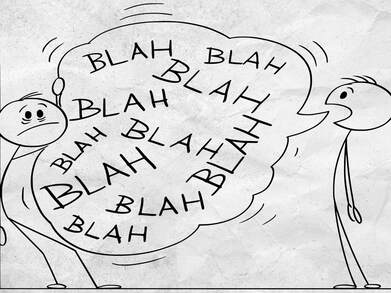
Not long after I began social work it was common to hold generic caseloads comprising children and family cases, older persons, mental health clients and various supervision order cases. I liked the variety, though it was soon to be replaced by specialism as part of the response to greater concern about child protection.
Older persons' cases were often for assessment, followed by various services such as Home Help, Day Care or respite or residential care. An assessment would cover a range of psycho-medico-social aspects. One aspect to address was continence, or rather incontinence, and whether it was single or double. I know, exciting stuff.
Many years later, after I had opted for specialist children and families work and had no continuing professional cause to consider incontinence of any kind, the term suddenly found a new use in my thinking. I have often reflected on the endless volume of words some people spout, and in a flash I saw this as a new and pernicious form of incontinence. 'Incontinent of speech' became an apt (but private) description for various people I encountered. They seemed unable to shut up, dribbled uncontrollably, and mostly inept in the ability to listen. I later came across the wonderful term, to 'overtalk' and posted about that here.
Some people link the overtalkers - those who are 'incontinent of speech' - with the arrival of social media platforms. For sure these provide additional avenues for endless gas-bagging, but the condition was already at epidemic levels. What is it that makes a substantial proportion of the human race gas on so much and listen so little? They have as little control over what constantly spouts from their vocal chords as the traditionally incontinent do over their sphincters.
Older persons' cases were often for assessment, followed by various services such as Home Help, Day Care or respite or residential care. An assessment would cover a range of psycho-medico-social aspects. One aspect to address was continence, or rather incontinence, and whether it was single or double. I know, exciting stuff.
Many years later, after I had opted for specialist children and families work and had no continuing professional cause to consider incontinence of any kind, the term suddenly found a new use in my thinking. I have often reflected on the endless volume of words some people spout, and in a flash I saw this as a new and pernicious form of incontinence. 'Incontinent of speech' became an apt (but private) description for various people I encountered. They seemed unable to shut up, dribbled uncontrollably, and mostly inept in the ability to listen. I later came across the wonderful term, to 'overtalk' and posted about that here.
Some people link the overtalkers - those who are 'incontinent of speech' - with the arrival of social media platforms. For sure these provide additional avenues for endless gas-bagging, but the condition was already at epidemic levels. What is it that makes a substantial proportion of the human race gas on so much and listen so little? They have as little control over what constantly spouts from their vocal chords as the traditionally incontinent do over their sphincters.
